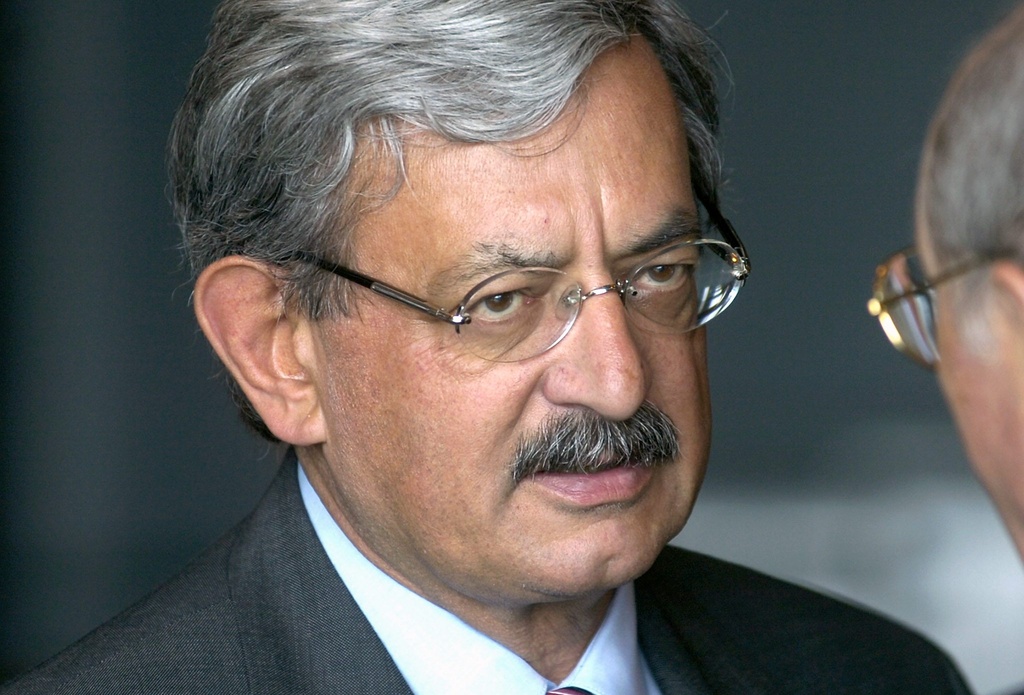Swiss image remains good in US eyes

The United States continues to have a good image of Switzerland, despite the alpine nation being strongly linked to the notion of tax havens.
What’s more, Switzerland’s image doesn’t appear to have been hurt by recent transatlantic disputes involving UBS and banking secrecy, according to a study by research centre IDHEAP on behalf of Presence Switzerland, the government’s PR agency.
“America loves Switzerland! We’re extremely similar: we’re dynamic, innovative, competitive worldwide, and that’s recognised in America,” Martin Naville, CEO of the Swiss-American Chamber of Commerce, told swissinfo.ch.
“But there is one aspect that America hates: in their view Switzerland protects American tax criminals. The association of Switzerland with tax havens is double Bermuda and 25 times that of Britain.”
That, he said, was a very dangerous image to have at a time when transparency and tax compliance were at the top of the international political agenda. “It’s not a cliché I’d like to continue carrying as a Swiss.”
Overall, Switzerland came second, behind Britain, among the respondents – 1,002 members of the general public and 401 opinion leaders – questioned at the end of 2009.
In the categories “innovation in science” and “sustainable development and protection of the environment” Switzerland came fourth, behind Germany, Britain and France – “a decent result for a small country,” according to IDHEAP’s Martial Pasquier, who presented the study in Bern on Friday.
The respondents also valued Switzerland’s political stability and high standard of education.
Good to talk
Nevertheless, Switzerland struggled to shake off its reputation as a tax haven. More than half (55 per cent of the general public and 65 per cent of opinion leaders) associated the term with Switzerland – easily ranking it number one. The Cayman Islands came second with 28 per cent.
Also, 52 per cent of opinion leaders didn’t think the Swiss government had taken effective measures to combat tax evasion.
“We really have to combat this image that Switzerland is by far the worst tax haven worldwide. We have to inform, inform, inform and that’s not something that can be done in six months, that’s a five- to15-year programme,” Naville said.
Despite that, 87 per cent of opinion leaders – and 81 per cent of the general population – agreed that “investors could feel fully confident” in Switzerland as a financial centre, putting it in top position.
The importance of constant communication was stressed by everyone.
“If Switzerland’s image in the US continues to be good, it is because communication work is undertaken on a continuing basis,” Pasquier told swissinfo.ch.
“It would be a mistake to think that because there are no problems nothing needs to be done. On the contrary! One should prepare for the next crisis, because there will definitely be one.”
Cultural difference
Johannes Matyassy, head of Presence Switzerland, agreed, saying he was happy with the study.
“It confirms that our strategy to have a permanent communication abroad is the right approach,” he told swissinfo.ch.
He also explained how things had changed over the years.
“First of all tax evasion wasn’t such an issue in the US four, five years ago. With the economic and financial crisis and also with the change in the government, it became a key issue,” he said.
“We also have to note that in the US tax evasion is a very, very serious crime. Maybe that’s also a difference in culture: in Switzerland tax evasion is not accepted but it’s not ranked as such a serious crime. As a result, Switzerland is in more headlines.”
Indeed tax evasion – deliberately concealing the true state of your assets from the tax authorities – is only a civil offence in Switzerland but criminal in most states.
Matyassy also explained how they balanced dynamic, innovative Switzerland on the one hand and chocolate-and-cheese Switzerland on the other.
“You have to take into account both. Switzerland has a very good image in general because of these stereotypes. I always say never destroy that. Keep them! It’s a positive basis on which one can show that Switzerland is much more than these stereotypes,” he said.
“This is also the concept for our Swiss pavilions and exhibitions. You have the stereotypes because if a Chinese or whoever comes to a Swiss pavilion, they want to see what they know about Switzerland but they are open to learning more about the country.”
Bright future
The study also showed that Americans were relatively knowledgeable about Swiss current affairs, with three-quarters aware of the arrest in Zurich of film director Roman Polanski in September. Fifty-five per cent knew about banking secrecy, but only 28 per cent knew that Switzerland and the US had signed a deal involving UBS.
Donald Beyer, the US ambassador to Switzerland, said he was “surprised and pleased” at his compatriots’ high perception of Switzerland.
“[Switzerland’s image] seems to have taken virtually no negative hits over the past ten years and there was very little difference between the people in general and the opinion leaders,” he told swissinfo.ch.
“I thought the untold story was Swiss innovation – that while Americans generally have a positive perception of Swiss innovation, it lags far behind Germany for example. That probably has to do with the size of the economy overall and the fact that Switzerland doesn’t make any cars.”
Beyer said another aspect he found “encouraging” was that despite a clear majority of Americans viewing Switzerland as a tax haven – “perhaps unfairly” – almost 90 per cent saw it as a very trustworthy place to do banking and finance.
“This suggests that there is a very positive future for Switzerland as a banking and financial centre once the debate about banking secrecy is over,” he said.
Thomas Stephens, swissinfo.ch
Between 1700 and 2003, about 460,000 Swiss citizens emigrated to the US. The number of Americans with Swiss origin is estimated to be around one million. Currently, about 74,000 Swiss citizens are living in the US, i.e. about 10% of the total of the Swiss abroad.
In 1822, Switzerland opened its first consulates in the US, in Washington and in New York. Sixty years later, the opening of the Swiss embassy in Washington marked Switzerland’s first embassy outside Europe.
Switzerland represents US interests in Iran (since 1980) and in Cuba (since 1961); it has also represented Cuban interests in the US since 1991.
Swiss-US cooperation consists of numerous bilateral treaties and arrangements, in fields such as double taxation and mutual assistance in criminal matters.
The Swiss-US Joint Economic Commission, established in 2000, works to strengthen the bilateral partnership and promote stability in the global economy.
Presence Switzerland has the task of dealing with threats to the country’s image abroad.
Part of the foreign ministry, the body tries to foster positive messages through projects abroad, by inviting foreign decision-makers and opinion-leaders to Switzerland, developing and distributing information about Switzerland abroad and by managing Switzerland’s presence at major international events.
The basis for all of Presence Switzerland’s communication is “Brand Switzerland”, through which the main messages and the visual profile of Switzerland abroad are determined.
(Source: Swiss foreign ministry)

In compliance with the JTI standards
More: SWI swissinfo.ch certified by the Journalism Trust Initiative





You can find an overview of ongoing debates with our journalists here. Please join us!
If you want to start a conversation about a topic raised in this article or want to report factual errors, email us at english@swissinfo.ch.